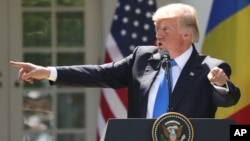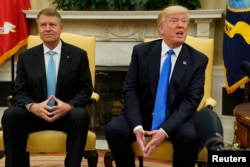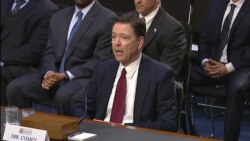U.S. President Donald Trump told reporters Friday that former FBI Director James Comey's testimony under oath before Congress on Thursday contained statements that weren't true.
Trump took questions from reporters in the Rose Garden outside the White House, in his first question-and-answer session with the media since May 18.
In answer to a reporter's question, the president denied he had asked for Comey's pledge of loyalty in a private meeting earlier this year.
"I hardly know the man," Trump said. "I'm not going to say 'I want you to pledge allegiance.' Who would do that?"
He also said he did not ask Comey to drop the FBI investigation of former National Security Adviser Michael Flynn and possible ties to Russia.
And the president said he would be happy to talk to special counsel Robert Mueller about those allegations, telling reporters, "I'd be glad to tell him exactly what I just told you."
Comey wrote memos about his recollection of those events because he said Thursday he did not trust the president to tell the truth about their conversations. Those memos are now in Mueller's possession, as he heads up the investigation of possible Russian involvement in the U.S. presidential campaign.
Trump was also asked if recordings exist of his conversations with Comey, as he has hinted in tweets in the past. Trump did not answer directly, saying only, "I'll tell you about that maybe sometime soon." Later, he told a reporter, "You're going to be very disappointed when you hear the answer."
Trump was appearing at the White House with Romanian President Klaus Iohannis. The two men met for the first time recently, at a summit where Trump blasted other NATO members for not paying their dues.
Iohannis offered support for Trump's position Friday, saying to Trump, "I'm very glad that due to your strong leadership NATO decided to go against terrorism. Your involvement made so many nations conscious of the fact that we have to share the burden inside NATO."
Trump also took a question about the United States' commitment to NATO, saying the U.S. is committed to Article 5, the NATO policy of "collective defense" — meaning, if one NATO country is attacked, it is considered an attack against all.
"Certainly, we are there to protect," Trump said. "That's one of the reasons I want people to make sure we have a very, very strong force [among NATO nations]. Absolutely, I'd be committed to Article 5."
He also said since he delivered his strong rebuke to NATO members, money "is starting to pour in" to NATO's coffers, presumably from members behind on their dues. "Other countries are starting to realize it's time to pay up," Trump said.
Trump's comments Friday afternoon came a few hours after he took to Twitter in the early morning to claim "total and complete vindication" in the Comey matter.
During his testimony Thursday, Comey told lawmakers that Trump was not a target in the bureau's investigation into Russia.
Trump fired Comey in May, saying "this Russia thing" was on his mind when he decided to dismiss the head of the nation's top law enforcement agency while Comey was leading its probe into Russia's alleged meddling in last year's election.
WATCH: Comey on why he was fired
Comey testified Thursday on Capitol Hill that he believed Trump was trying to get him to drop an investigation of Trump's former national security adviser, Michael Flynn, and that White House officials spread "lies, plain and simple" to cover up the reason behind Comey's dismissal.
"There's no doubt that I was fired because of the Russia investigation," Comey told lawmakers, referring to the widening probe of Russian influence on last year's U.S. presidential election. American intelligence agencies have said it was an effort by the Kremlin to help Trump defeat his Democratic opponent, former Secretary of State Hillary Clinton.
Comey's nearly three-hour testimony before the Senate Intelligence Committee was his first chance to speak in public about the meetings and conversations he had with Trump during the months before being fired.








